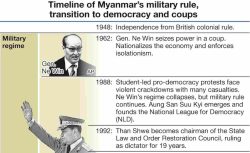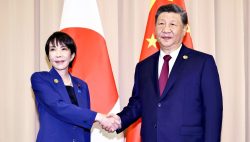Defense Cooperation: Japan Must Take The Lead in Collaboration with U.S., S. Korea
15:33 JST, December 12, 2024
Security cooperation among Japan, the United States and South Korea had finally been getting on track, but South Korean politics are becoming increasingly unsettled. There also are concerns that the foreign policy of the United States could be shaken by a transfer of power.
Japan must play a leading role in order to maintain the unity of the three countries.
U.S. Defense Secretary Lloyd Austin visited Japan and met with Defense Minister Gen Nakatani. They discussed how the defense cooperation among the three countries should be conducted in light of the political turmoil in South Korea.
During his 2½ years in office, South Korean President Yoon Suk Yeol has significantly improved relations between Japan and South Korea. The three countries have realized a mechanism for the immediate sharing of information on North Korea’s missile launches, and have also begun cross-domain joint drills, including in the cyber field.
If Yoon were forced to step down and be replaced by an administration with an anti-Japanese tendency, such defense cooperation would be sure to stall.
At the defense meeting, Austin said, “America’s extended deterrence commitment to Japan and the Republic of Korea is ironclad,” indicating that Washington will protect its allies with its military might, including its nuclear weapons.
Austin’s emphasis at the Japan-U.S. meeting that South Korea is also covered by the extended deterrence may have been aimed at keeping South Korea within the framework of defense cooperation among the three countries. Austin was scheduled to visit both Japan and South Korea but canceled his visit to South Korea.
On the other hand, the U.S. foreign policy of valuing alliances is at risk.
Donald Trump, who will return to the presidency next month, is said to tend to prioritize his own country’s interests over supporting the international order. It can be said that security cooperation among the three countries is on the brink of collapse.
Russia and North Korea are deepening military cooperation. China has violated Japan’s airspace and territorial waters and repeatedly conducted large-scale military exercises around Taiwan. In the event of a contingency around Taiwan, Japan would not be unscathed.
Cooperation among the three countries is essential for peace and stability in the Asia-Pacific region. Japan needs to persistently work to persuade the incoming U.S. administration that incorporating cooperation with Asia leads to the interest of the United States.
In the United States, the engine of an Osprey transport aircraft reportedly failed last month and nearly crashed. The U.S. military has temporarily suspended Osprey operations. The Ground Self-Defense Force has also suspended the operations of 17 Osprey aircraft it purchased from the United States. At the meeting, Nakatani asked Austin to provide information on the issue.
In addition to the Osprey, Japan imports a lot of equipment from the United States. If confidence in the equipment is damaged, the alliance could be hindered. It is important for the United States to disclose information on equipment issues.
(From The Yomiuri Shimbun, Dec. 12, 2024)
Top Articles in Editorial & Columns
-

Myanmar Will Continue Under Military Rule Even After Election, Ex-Ambassador Maruyama Says in Exclusive Interview
-

40 Million Foreign Visitors to Japan: Urgent Measures Should Be Implemented to Tackle Overtourism
-

Expansion of New NISA: Devise Ways to Build up Household Assets
-

China Criticizes Sanae Takaichi, but China Itself Is to Blame for Worsening Relations with Japan
-

Withdrawal from International Organizations: U.S. Makes High-handed Move that Undermines Multilateral Cooperation
JN ACCESS RANKING
-

Univ. in Japan, Tokyo-Based Startup to Develop Satellite for Disaster Prevention Measures, Bears
-

JAL, ANA Cancel Flights During 3-day Holiday Weekend due to Blizzard
-

China Confirmed to Be Operating Drilling Vessel Near Japan-China Median Line
-

China Eyes Rare Earth Foothold in Malaysia to Maintain Dominance, Counter Japan, U.S.
-

Japan Institute to Use Domestic Commercial Optical Lattice Clock to Set Japan Standard Time



















